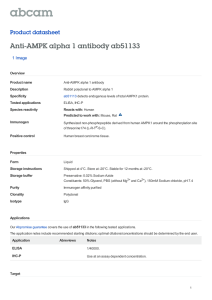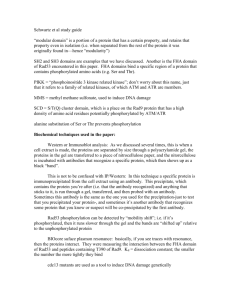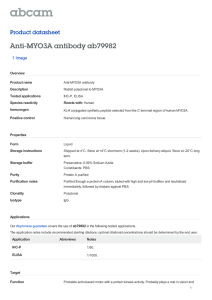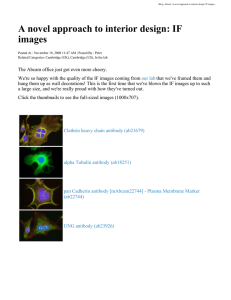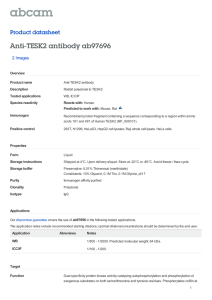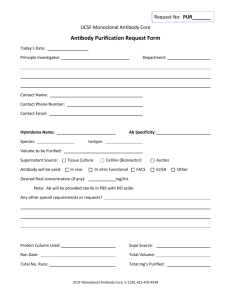Mouse (monoclonal) Anti-Human c
advertisement
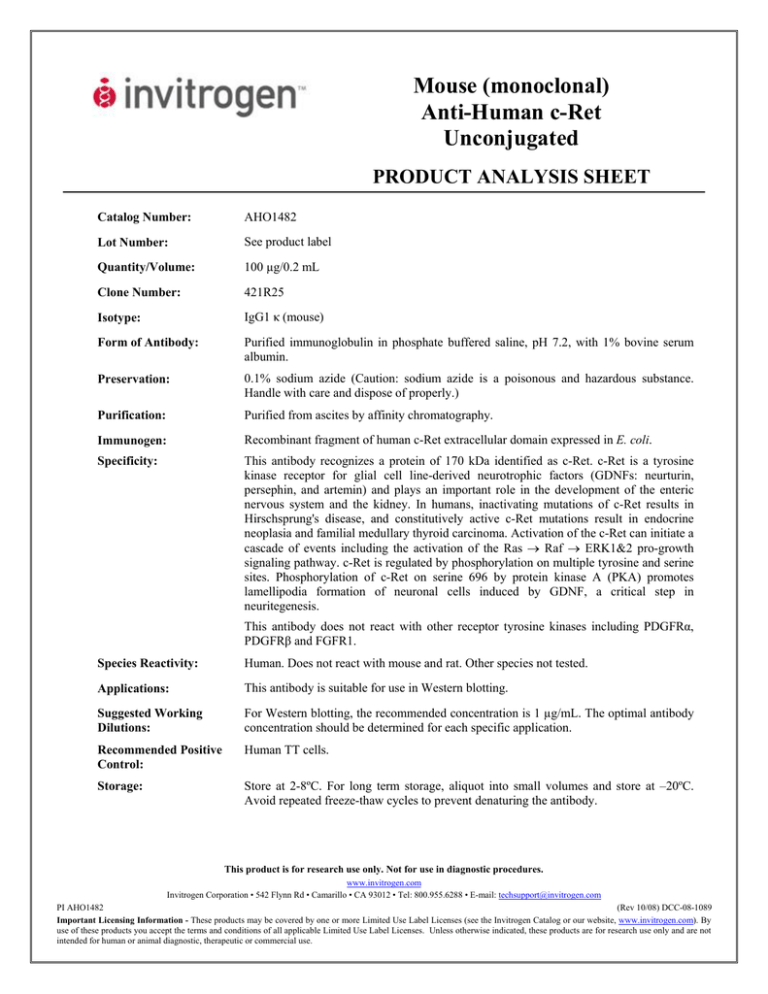
Mouse (monoclonal) Anti-Human c-Ret Unconjugated PRODUCT ANALYSIS SHEET Catalog Number: AHO1482 Lot Number: See product label Quantity/Volume: 100 µg/0.2 mL Clone Number: 421R25 Isotype: IgG1 κ (mouse) Form of Antibody: Purified immunoglobulin in phosphate buffered saline, pH 7.2, with 1% bovine serum albumin. Preservation: 0.1% sodium azide (Caution: sodium azide is a poisonous and hazardous substance. Handle with care and dispose of properly.) Purification: Purified from ascites by affinity chromatography. Immunogen: Recombinant fragment of human c-Ret extracellular domain expressed in E. coli. Specificity: This antibody recognizes a protein of 170 kDa identified as c-Ret. c-Ret is a tyrosine kinase receptor for glial cell line-derived neurotrophic factors (GDNFs: neurturin, persephin, and artemin) and plays an important role in the development of the enteric nervous system and the kidney. In humans, inactivating mutations of c-Ret results in Hirschsprung's disease, and constitutively active c-Ret mutations result in endocrine neoplasia and familial medullary thyroid carcinoma. Activation of the c-Ret can initiate a cascade of events including the activation of the Ras → Raf → ERK1&2 pro-growth signaling pathway. c-Ret is regulated by phosphorylation on multiple tyrosine and serine sites. Phosphorylation of c-Ret on serine 696 by protein kinase A (PKA) promotes lamellipodia formation of neuronal cells induced by GDNF, a critical step in neuritegenesis. This antibody does not react with other receptor tyrosine kinases including PDGFRα, PDGFRβ and FGFR1. Species Reactivity: Human. Does not react with mouse and rat. Other species not tested. Applications: This antibody is suitable for use in Western blotting. Suggested Working Dilutions: For Western blotting, the recommended concentration is 1 µg/mL. The optimal antibody concentration should be determined for each specific application. Recommended Positive Control: Human TT cells. Storage: Store at 2-8ºC. For long term storage, aliquot into small volumes and store at –20ºC. Avoid repeated freeze-thaw cycles to prevent denaturing the antibody. This product is for research use only. Not for use in diagnostic procedures. www.invitrogen.com Invitrogen Corporation • 542 Flynn Rd • Camarillo • CA 93012 • Tel: 800.955.6288 • E-mail: techsupport@invitrogen.com PI AHO1482 (Rev 10/08) DCC-08-1089 Important Licensing Information - These products may be covered by one or more Limited Use Label Licenses (see the Invitrogen Catalog or our website, www.invitrogen.com). By use of these products you accept the terms and conditions of all applicable Limited Use Label Licenses. Unless otherwise indicated, these products are for research use only and are not intended for human or animal diagnostic, therapeutic or commercial use. Fukuda, T., et al. (2002) Novel mechanism of regulation of Rac activity and lamellipodia formation by RET tyrosine kinase. J. Biol. Chem. 277(21):19114-19121. References: Carlomagno, F., et al. (2002) The kinase inhibitor PP1 blocks tumorigenesis induced by RET oncogenes. Cancer Res. 62(4):1077-1082. Cohen, M.S., et al. (2002) Inhibition of medullary thyroid carcinoma cell proliferation and RET phosphorylation by tyrosine kinase inhibitors. Surgery 132(6):960-967. You, L., et al. (2001) Glial cell-derived neurotrophic factor (GDNF)-induced migration and signal transduction in corneal epithelial cells. Invest. Ophthalmol. Vis. Sci. 42(11):2496-2504. Jing, S., et al. (1996) GDNF-induced activation of the Ret protein tyrosine kinase is mediated by GDNFR-α, a novel receptor for GDNF. Cell 85(7):1113-1124. Edery, P., et al. (1994) Mutations of the RET proto-oncogene in Hirschsprung’s disease. Nature 367(6461):378–380. Related Products: c-Ret [pS696] Phosphorylation Site Specific Antibody Cat. # 44-274 PAK1/2/3 [pS141] Phosphorylation Site Specific Antibody Cat. # 44-940G Pro-Growth Sampler Pack Cat. # 44-587G Dok-2 [pY142] (mouse) Phosphorylation Site Specific Antibody Cat. # 44-264 c-Jun [pS73] Phosphorylation Site Specific Antibody Cat. # 44-292G Cat. # 44-482 160 Vav1 [pY ] Phosphorylation Site Specific Antibody 170 kDa Western Blot Analysis Proteins from cell extracts of human TT cells were resolved by SDS-PAGE and transferred to PVDF. The membranes were incubated with this c-Ret monoclonal antibody (clone 421R25) at a concentration of 1 µg/mL for two hours at room temperature. After washing, the membranes were incubated with a goat F(ab’)2 anti-mouse IgG alkaline phosphatase conjugated antibody (Cat. # AMI4405) at a 1:2000 dilution. Bands were detected with CDP-substrate using the WesternStarTM method (Tropix) and Kodak BioMax film. This product is for research use only. Not for use in diagnostic procedures. www.invitrogen.com Invitrogen Corporation • 542 Flynn Rd • Camarillo • CA 93012 • Tel: 800.955.6288 • E-mail: techsupport@invitrogen.com PI AHO1482 (Rev 10/08) DCC-08-1089 Important Licensing Information - These products may be covered by one or more Limited Use Label Licenses (see the Invitrogen Catalog or our website, www.invitrogen.com). By use of these products you accept the terms and conditions of all applicable Limited Use Label Licenses. Unless otherwise indicated, these products are for research use only and are not intended for human or animal diagnostic, therapeutic or commercial use.
